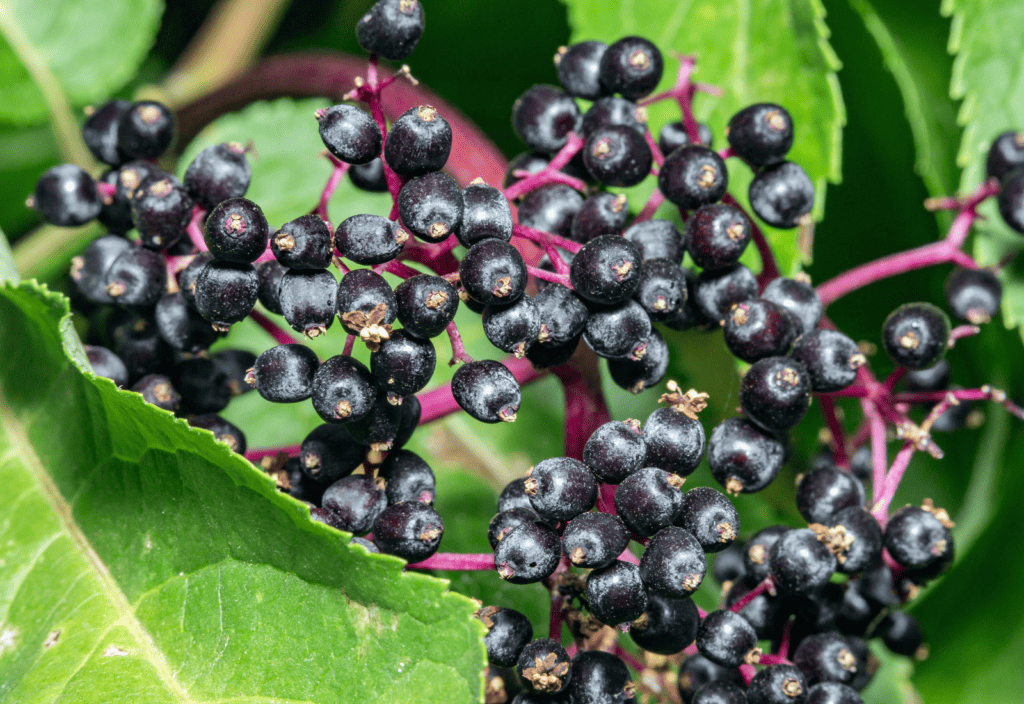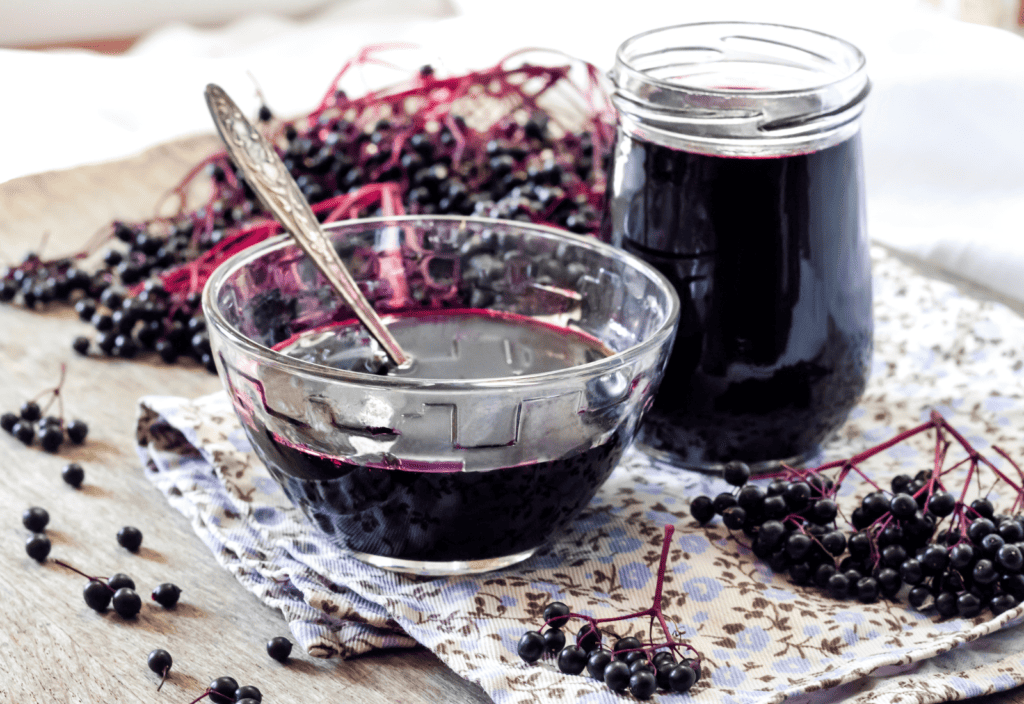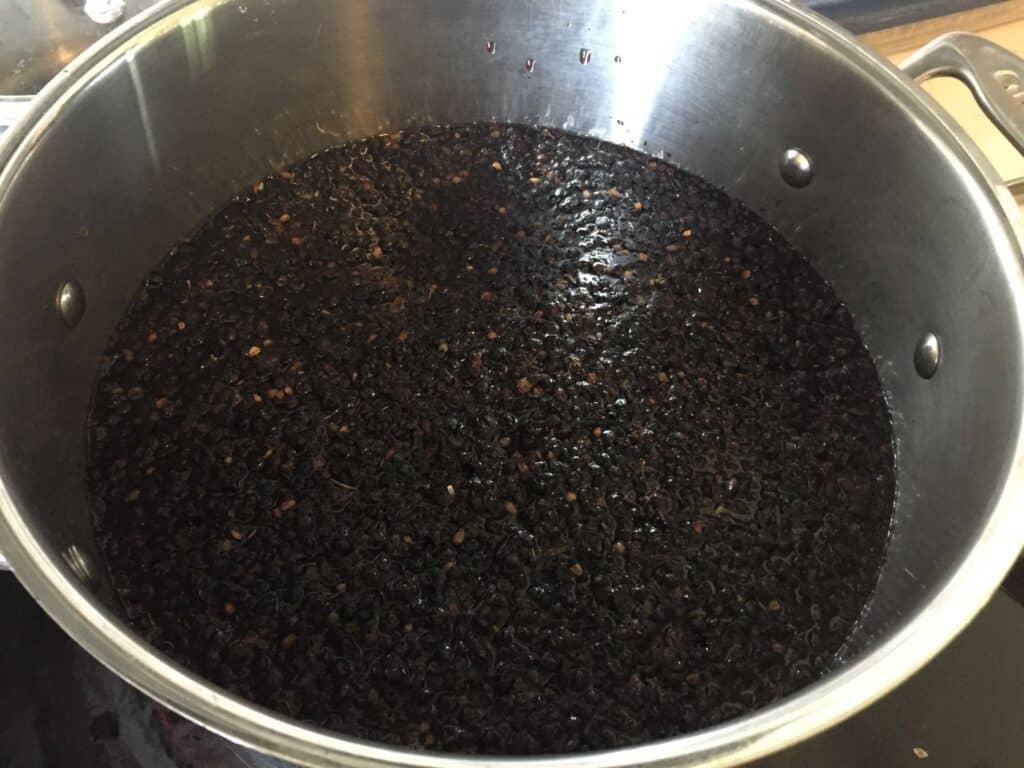Elderberry syrup is known for its role in preventing and treating upper respiratory illnesses. While many people swear by it, and it has become increasingly popular in recent years, does elderberry syrup really work? The short answer is yes, but let’s dig into the details of its uses and effectiveness.

This post contains affiliate links. At no additional cost to you, I may earn a small commission on qualifying purchases. This information is for educational purposes only. Always check with your medical provider before beginning an herbal regimen.
What is Elderberry?
Elderberry is the dark purple berry of the European or black elder/Sambucus tree, which grows in the warmer parts of Europe, North America, Asia, and Northern Africa. Elderberries are antioxidant-rich fruits that are often promoted for upper respiratory infections like cold and flu.
Raw elderberries are toxic, so never eat them uncooked. The seeds contain a cyanide-inducing glycoside, which can cause nausea, vomiting and diarrhea. Cooking the elderberries, however, makes them safe for consumption.
History of Elderberry
The history of elderberry is a rich one dating back to the time of Hippocrates in 400BC who is said to have referred to the elder tree as his “medicine chest.” Black elder has been used for centuries in Europe, northern Africa and some parts of Asia.
Elderberry was a key ingredient used by herbalists, pharmacists and physicians before antibiotics were discovered. Ancient Egyptians utilized elderberries for skin conditions and burns, which may be why it has recently started popping up in mainstream skincare products.
It became really popular in the U.S. about a decade ago. If was featured in the popular television series “The Walking Dead.” It’s likely that this had something to do with its huge increase in popularity in the U.S. over the past decade.
Nutritional Breakdown of Elderberries
Elderberries are high in vitamin C and dietary fiber. They are an excellent source of phenolic acids, which are potent antioxidants that can help reduce damage from oxidative stress in the body. Elderberries are also a good source of the flavonoids (quercetin, kaempferol and isorhamnetin).
They contain about 10 times more flavonoids than the most common berries, which are linked to a reduced risk of chronic diseases as well as improved cognitive function.
Does Elderberry Syrup Really Work? (Supporting Studies)
There’s quite a bit of supporting data for elderberry syrup and similar forms of elderberry, so I’ve divided it into sections by use.

How Does Elderberry Help Flu?
Studies show that elderberry can fight and shorten the duration of some flu strains specifically H1N1. The activities from elderberry flavonoids were comparable to the anti-influenza activities of Tamiflu.
Another study showed a whopping 4-day reduction in symptoms for patients infected with flu strains A and B.
Another study showed that elderberry had a mild inhibitory effect at the early stages of the influenza virus cycle, with a much stronger effect in the post-infection phase.
Does Elderberry Work for Colds?
A 2016 study shows reduced cold duration for air travelers. Slightly more colds occurred in the placebo group, but there was not a significant difference. The significance was found in the duration of the cold and severity of symptoms. The elderberry group had less severe colds that were shorter in duration.
A Switzerland study examined the use of a product called Sinupret, which contains elderberry extract. The product was used to treat bacterial sinusitis along with an antibiotic and a decongestant.
Those who took the combination (including the Sinupret/elderberry product) had fewer symptoms than those who only took the antibiotic and decongestant.
For more simple ways to prevent and shorten the duration of colds, check out my related post, What Prevents a Cold? 8 Proven Strategies to Reduce Sick Days.
Can Elderberry Improve Allergies?
Elderberries have anti-inflammatory properties, which is why they are effective in combating allergies. Allergic reactions are the immune systems over response to an allergen, and elderberries calm that response.
Now, let’s look at some of the powerhouse spices that are commonly added to elderberry syrup—ginger, cinnamon and clove.
How Ginger Improves Lung Health
Ginger is one of the most powerful spices that you can add to elderberry syrup. In a mouse study, ginger reduced lung damage and protected the lungs from severe damage from hyperoxia and inflammation, which can lead to bronchopulmonary dysplasia (BPD) in premature infants.
Ginger has also been shown to relax the airways in asthmatic patients.
The Anti-inflammatory Properties of Cinnamon
We shouldn’t discount cinnamon as something that simply smells and tastes delicious. It has powerful anti-inflammatory properties according to Cleveland Clinic. It has even been recommended as a potential aid in Covid-19 infections by some experts.
The Benefits of Clove
Clove offers impressive antiviral, anti-inflammatory, and antithrombotic effects. Like cinnamon, clove has been discussed as a potential helper against Covid-19 and similar viruses.
Additional Uses for Elderberry Syrup
Elderberry is a natural diuretic with cancer-fighting potential. It can help stabilize blood sugar, fight inflammation within the body and can be a secret weapon for damaged or aging skin.
How to Make Elderberry Syrup
Homemade elderberry syrup is ideal if you have the time to make it. It’s super simple to make from dried berries assuming you don’t have access to fresh elderberries. You can add fresh ginger, cinnamon, clove and other herbs and spices for even more healing power.

Wellness Mama has a simple tutorial, which is how I started out. If you are like me and like to keep things low sugar, you may want to reduce the honey a bit.
Local honey is great if you are able to track some down, but here is a store-bought raw, unfiltered honey if needed. If homemade elderberry syrup isn’t your thing or you need it quickly, Gaia is trusted brand that’s not loaded with sugar/corn syrup.
Gaia also offers elderberry gummies that are junk free and sweetened with fruit concentrate. Beware as some of the popular brands contain a lot of added sugar. Other options are elderberry tea and capsules.
What is The Recommended Dosage for Elderberry Syrup?
Active Cold or Flu Elderberry Dose
Most herbalists and medical professionals recommend dosing elderberry 4x per day with an active flu or cold. A standard dose is 1 tsp. for children and 2 tsp. for adults.
Prevention or Allergy Maintenance Elderberry Dose
For prevention or allergy maintenance, most herbalists and medical professionals, recommend 1-2 doses daily. Again, with a standard dose of 1 tsp. for children and 2 tsp. for adults.
Conclusion
While elderberry isn’t a miracle cure, it is a powerful and effective tool when it comes to colds, flu, allergies and more. It also tastes great, which doesn’t hurt the appeal. I hope this post answered the question, “Does elderberry syrup really work?”
As with many supplements and medications, elderberry may not be recommended for women who are pregnant or breastfeeding or those with autoimmune disorders. Always talk to a trusted medical provider before beginning a new regimen.